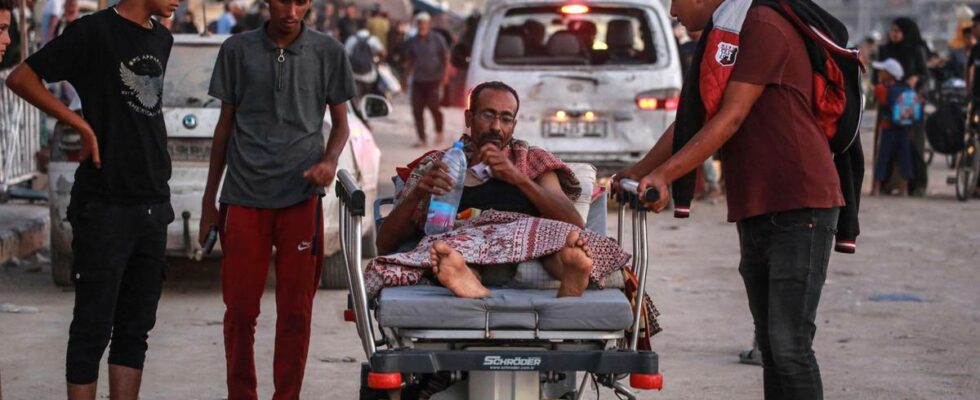In this case, you can read more about: Since October 7, more than 94,000 people have been injured in Israeli attacks, according to Palestinian health authorities. 20 of Gaza’s 36 hospitals have been completely put out of business, reports the World Health Organization (WHO). The rest only works partially. Organizations and health personnel have warned of a critical shortage of equipment, medicines, clean water and safe zones. A man lies on a hospital bed in the street outside a hospital in Gaza. Photo: Ramadan Abed / Reuters In June, Prime Minister Jonas Gahr Støre (Ap) announced that Norway will accept 20 patients who need health care they cannot get in Gaza. But the process of getting them out of the Gaza Strip and into Norway is complicated. And the 20 hospital beds at Oslo University Hospital are still empty. The patients and relatives must be assessed by PST and PU before they can be granted entry and residence. PST will not comment on whether they have carried out any assessments yet. According to the Ministry of Foreign Affairs, around 12,000 Palestinians have requested medical evacuation. But only a few have been allowed to leave Gaza after the border crossing to Egypt was closed in May. – These have already been transported on to other countries, says Development Minister Anne Beathe Kristiansen Tvinnereim (Sp) Tvinnereim to news. Photo: Amanda Iversen Orlich / n654171 – Unfortunately, we cannot say anything concrete about when the patients will come to Norway, but we are working to make this happen as quickly as possible. Tvinnereim says it is crucial that the Rafah border is opened so that more people can get out. – It is also important that the patients again have the opportunity to travel for treatment at Palestinian hospitals in the West Bank, including East Jerusalem, as they did before 7 October last year. We are now looking at various solutions to be able to help patients from Gaza. Dina Hovland, midwife and president of Doctors Without Borders, says the Israeli authorities must take action. – It is heartbreaking with all the patients in Gaza who are in such great need of medical treatment, but who do not get the help they need, neither in Gaza nor by being evacuated to other places, she says. – This does not only apply to the seriously injured, there are also many who need specialized treatment for cancer or advanced surgery for heart disease. Photo: Doctors Without Borders The organization recently opened a field hospital in Gaza. On the ground, their 700 employees are under enormous pressure, and there is a shortage of medicine and equipment. – We cannot give our patients the treatment they are entitled to. Among other things, we have had to reduce how often we change the bandages on our patients, which also increases the risk of infection, says Hovland. news has been in contact with the IDF and the Israeli Ministry of Defense’s coordinator for Israel’s activities in Gaza and the West Bank (COGAT). According to COGAT, the closure of the Rafah border does not affect medical evacuations. Instead, the Kerem Shalom crossing is used, they say. – The IDF is obliged to cooperate with the international community to arrange the departure of patients for treatment in other countries. This effort is carried out despite the security challenges of emigrating patients during war. According to COGAT, 196 Palestinians were evacuated to hospitals in Dubai and Jordan respectively at the end of July. A total of 3,686 patients plus accompanying persons have reportedly been evacuated to hospitals outside Gaza since October. – If there is no obstacle for security reasons, and reception has been coordinated in a third country, the State of Israel is willing to allow and facilitate the departure of patients. Line Khateeb, leader of the Palestine Committee, says medical evacuation has been a topic they have raised with the Foreign Ministry and Norwegian politicians since 7 October. Photo: Terje Haugnes / news – I have the impression that the Norwegian authorities are doing everything they can to make it happen. But they have started very late to get the evacuation in place. Israel now has much stronger control over who comes out and how. Khateeb says the situation underlines the need for an immediate ceasefire. – The hospitals need electricity and fuel, and people don’t even have access to clean water and soap. A huge effort is also needed to rebuild the hospitals in Gaza. Three months after Israel and Hamas said they agreed to the plan put forward by US President Joe Biden, negotiations remain deadlocked. In Israel, there have been large protests because the government has not put a hostage agreement in place. – Hamas certainly has a responsibility for a ceasefire, but I wish Netanyahu would listen to his people and to the UN resolution on a ceasefire, says Khateeb. Published 06.09.2024, at 21.58
ttn-69
Don’t know when Gaza patients will come to Norway – news Urix – Foreign news and documentaries

